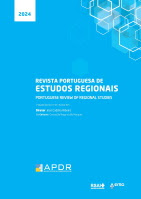Vol. 22, Núm. 2 (2024): PASOS Revista de Turismo y Patrimonio Cultural
Planeamento Territorial
Espaço de divulgação e debate de ideias relativas ao planeamento do território, à economia do turismo e ao desenvolvimento regional.
sexta-feira, abril 19, 2024
segunda-feira, abril 15, 2024
31º Congresso da APDR: comunicação submetida
Bibliometric analysis of the research on St. James Way performed for the period 1997-2023
Leida Costa, Paula Remoaldo, Hélder Lopes, José Cadima Ribeiro, Vítor Ribeiro e Rafaela Silva
Abstract
The aim of this paper is to perform a bibliometric analysis of publications related to the St. James Way indexed in the Scopus database in the period 1997-2023. This is the first time that this kind of study is done concerning this period of 26 years. 139 studies and several variables were taken into consideration, such as, the type and year of publication, subjects approached, methods, techniques used, and country of publication. It was noted that the amount of the studies related to the St. James Way is reduced, and that the first study indexed in Scopus database dates back to 1997. The data collected in the Scopus database was analyzed using the VOsviewer tool. This tool allowed the generation of a set of thematic network maps using analysis of keyword occurrences, documents and countries with the highest number of publications, journals with the highest number of publications and most productive authors. It was found that there is a relationship between the keywords inserted in the database, that is, there are authors who, when approaching the Way, used three to four common keywords ("pilgrims", "tourism", "religion", and " St. James Way"). The subject of St. James Way attracts research from many scientific areas, such as Economy, Arts and Humanities, Social Sciences, Law and Environmental Sciences. Since 2011, the number of publications indexed in Scopus increased a lot, but it was since 2019 that the number increased in a more substantial way, along with the diffusion and interest in this religious and cultural route. Between 1997 and 2015, the studies had a more general nature, with descriptive stories about the Camino, and its evolution since the medieval age. Since 2016, the number of empirical studies has been increasing. This study can contribute to the evolution of research on religious tourism and pilgrimage, especially the one concerning the St. James Way routes.
Keywords: Bibliometric
Study; Scopus Database; Camino de Santiago; St. James Way; VOSviewer.
sexta-feira, abril 12, 2024
quinta-feira, março 21, 2024
O Caminho Português de Santiago: excerto de texto a integrar em livro em processo de produção
quinta-feira, fevereiro 01, 2024
quinta-feira, janeiro 18, 2024
Revista Portuguesa de Estudos Regionais: issue N. 67 (2024) published
It is a pleasure to inform you that the issue n. 67 (January 2024) of our journal (Revista Portuguesa de Estudos Regionais / Portuguese Review of Regional Studies) is now online. You can accede to the issue using the following link:
https://review-rper.com/index.php/rper/issue/view/67
Thank you for
contributing to the success of the journal. We will go on counting on you!
I wish you all a
successful year 2024!
Best regards,
J. Cadima Ribeiro
quinta-feira, janeiro 04, 2024
ERSA 2024, Ilha Terceira, Açores: apêlo à submissão de comunicações (2)
Sustainability in Tourist Destinations: A Multidimensional Approach
Laurentina Vareiro
UNIAG, Lab2PT and Polytechnic University of Cávado and Ave (IPCA),Barcelos,
Portugal, lvareiro@ipca.pt (corresponding
convener)
Paula Remoaldo
Lab2PT and Institute of Social Sciences, University of Minho, Braga, Portugal, cris.remoaldo@gmail.com
José Cadima Ribeiro
NIPE and Lab2PT,
University of Minho, Braga, Portugal, jcadima@eeg.uminho.pt
Abstract
This
session seeks to scrutinize the various dimensions of sustainability in tourist
destinations. By dissecting the eco-footprint of accommodation, investigating
the provenance of culinary resources, and assessing the ecological impacts of
entertainment activities, we aim to analyse the multiple dimensions involved (a holistic approach) in destinations
sustainability. The discourse will extend to encompass the integration of
environmental preservation, community involvement and economic viability. This
session aims to provide new insights on the issue, exploring innovative
methodologies to maintain the allure of tourist destinations while ensuring
their enduring ecological and societal well-being.
Your
contribution is pivotal to advancing on the discourse on responsible and
sustainable tourism practices. Theoretical and empirical backgrounds are accepted. The main
research areas of this Special Session are the following topics:
1. Conceptualization of Comprehensive Sustainability in Tourist Destinations.
2.
Bibliometric Analysis of Sustainable
Practices in Tourism Activities.
3.
Best Practices on Environmental,
Social and Economic Sustainability in the Tourism Industry.
4.
Best Practices for Attaining Destination
Sustainability.
5.
Sustainable Practices in
Accommodation and/or Food Provision.
6.
Engaging Residents in the Promotion
of Sustainable Destinations.
7.
Engaging Politicians in the Promotion
of Sustainable Destinations.
8.
Political Difficulties in
Implementing Destinations Sustainability.
9.
Sociocultural Difficulties in
Implementing Destinations Sustainability.
10. Quantitative
Methods in the Analysis of Sustainable Practices in Tourism.
11. Qualitative
Methods in the Analysis of Sustainable Practices in Tourism.
12. New
Approaches to Tourism Sustainable Practices.
13. The
Future of Destinations Sustainability.




